Expert Garden Landscapers: Transforming Your Outdoor Space with Professional Gardener Services
Introduction to Garden Landscaping Services
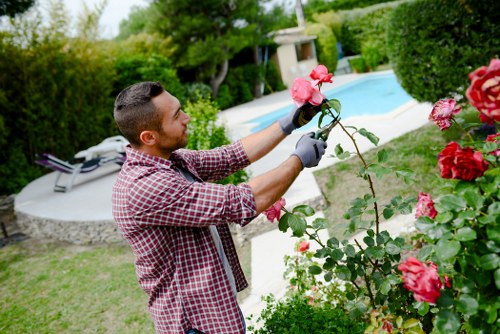
Creating a beautiful and sustainable outdoor space requires more than just planting a few flowers or mowing the lawn. It involves a comprehensive understanding of design principles, plant biology, and environmental factors. This is where garden landscapers come into play, offering professional gardener services that transform ordinary yards into stunning landscapes. Whether you're looking to redesign your garden, install new features, or maintain your existing outdoor space, garden landscapers provide the expertise and creativity needed to bring your vision to life.
Garden landscaping is an art and a science, combining aesthetic appeal with functionality. A well-designed garden not only enhances the beauty of your home but also provides a peaceful retreat, a place for family gatherings, and a habitat for local wildlife. Professional garden landscapers consider various elements such as soil quality, climate, plant selection, and sustainability practices to create a harmonious and thriving outdoor environment.
Investing in gardener services can significantly increase the value of your property, making it more attractive to potential buyers and providing a serene living space for you and your family. From initial design concepts to ongoing maintenance, garden landscapers offer a range of services tailored to meet your specific needs and preferences.
Comprehensive Garden Landscaping Services
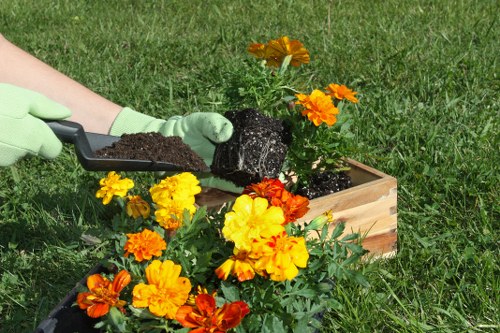
Garden landscapers provide a wide array of services that cater to different aspects of outdoor space management and design. Here are some of the key services offered by professional garden landscapers:
- Landscape Design: Creating detailed plans and layouts that include plant selection, hardscaping elements, and overall garden aesthetics.
- Planting and Installation: Selecting and planting a variety of flora, from trees and shrubs to flowers and ground covers, ensuring they thrive in the local climate.
- Hardscaping: Designing and installing structures such as patios, walkways, retaining walls, and water features that add functionality and visual interest to your garden.
- Irrigation Systems: Implementing efficient watering solutions to maintain healthy plant growth while conserving water resources.
- Garden Maintenance: Providing ongoing care, including pruning, fertilizing, pest control, and lawn care to keep your garden looking its best year-round.
- Eco-friendly Solutions: Utilizing sustainable practices and native plants to promote biodiversity and reduce environmental impact.
The Importance of Professional Garden Landscaping
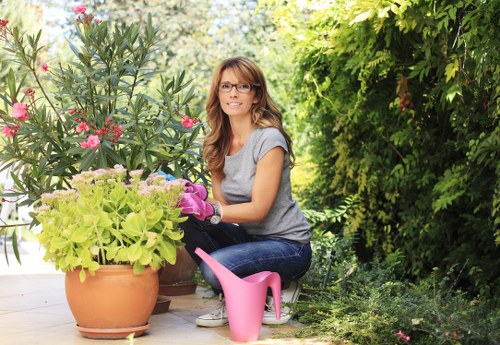
Hiring professional garden landscapers offers numerous benefits that go beyond mere aesthetics. Here are some reasons why investing in professional gardener services is essential for your outdoor space:
- Expertise and Experience: Professional landscapers bring a wealth of knowledge and experience, ensuring that your garden is designed and maintained effectively.
- Customized Solutions: They work closely with you to understand your preferences and needs, providing tailored solutions that reflect your personal style and functional requirements.
- Time and Cost Efficiency: Professionals can complete projects more quickly and cost-effectively, avoiding common pitfalls and ensuring that resources are used wisely.
- Enhanced Property Value: A well-maintained and beautifully landscaped garden can significantly increase the market value of your property.
- Sustainability: Expert landscapers incorporate eco-friendly practices, promoting environmental sustainability and reducing the ecological footprint of your garden.
- Pest and Disease Management: Professionals identify and address potential issues proactively, ensuring the health and longevity of your plants.
Designing Your Perfect Garden Landscape
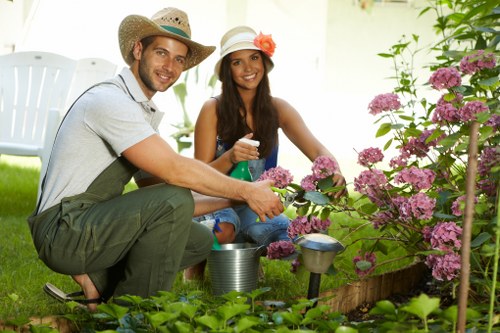
Designing a garden landscape involves careful planning and consideration of various factors to create a space that is both beautiful and functional. Here are some key elements that garden landscapers focus on during the design process:
1. Understanding Your Vision
Every successful garden begins with a clear vision. Garden landscapers engage with clients to understand their preferences, lifestyle needs, and the intended use of the outdoor space. Whether you desire a tranquil retreat, an entertainment area, or a vibrant floral display, your landscaper will tailor the design to align with your goals.
2. Site Analysis
A thorough site analysis is crucial in determining the best design approach. Landscape professionals assess factors such as soil quality, sunlight exposure, drainage patterns, and existing vegetation. This analysis helps in selecting appropriate plant species and designing structures that complement the natural environment.
3. Plant Selection
Choosing the right plants is essential for creating a sustainable and visually appealing garden. Garden landscapers select a diverse range of plants that thrive in the local climate, provide year-round interest, and support native wildlife. They also consider factors like growth patterns, maintenance requirements, and color schemes to ensure a cohesive and harmonious garden design.
4. Hardscaping Elements
Incorporating hardscaping features such as patios, walkways, fences, and water features adds structure and functionality to your garden. Professional landscapers design these elements to enhance accessibility, define different garden zones, and contribute to the overall aesthetic appeal.
5. Sustainability Practices
Modern garden landscaping emphasizes sustainability and eco-friendly practices. This includes using native plants, implementing water-efficient irrigation systems, and utilizing recycled or locally sourced materials for hardscaping. Sustainable landscaping not only benefits the environment but also reduces maintenance efforts and costs in the long run.
Maintenance Services for a Thriving Garden
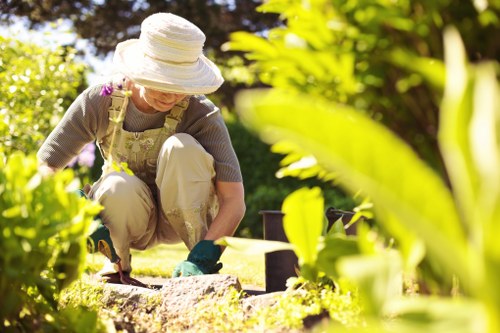
Maintaining a beautiful garden requires regular care and attention. Professional garden landscapers offer comprehensive maintenance services to ensure that your outdoor space remains healthy and attractive throughout the year. Key aspects of garden maintenance include:
- Lawn Care: Regular mowing, edging, fertilizing, and weed control to keep your lawn lush and well-groomed.
- Pruning and Trimming: Shaping and trimming plants, shrubs, and trees to promote healthy growth and maintain the desired form.
- Weed Management: Identifying and removing invasive weeds that can compete with desirable plants for resources.
- Fertilization and Soil Health: Applying fertilizers and soil amendments to ensure that plants have the nutrients they need to thrive.
- Pest and Disease Control: Monitoring for pests and diseases and implementing appropriate treatments to protect your garden.
- Seasonal Clean-up: Preparing your garden for each season by removing dead foliage, mulching, and planting seasonal flowers.
Why Regular Maintenance Matters
Regular maintenance is crucial for the longevity and beauty of your garden. It prevents the overgrowth of plants, reduces the risk of pest infestations, and ensures that your outdoor space remains safe and inviting. By enlisting the help of professional garden landscapers, you can enjoy a vibrant and well-maintained garden without the stress and effort of managing it yourself.
Customized Maintenance Plans
Every garden is unique, and maintenance needs can vary based on plant types, climate, and personal preferences. Professional landscapers offer customized maintenance plans that cater to the specific requirements of your garden. These plans often include regular visits, detailed care schedules, and flexible services that adapt to seasonal changes and evolving garden needs.
Whether you require weekly maintenance or just seasonal check-ups, having a professional team handle your garden care ensures that your outdoor space remains a source of pride and relaxation.
Choosing the Right Garden Landscaper for Your Needs

Selecting the right garden landscaper is pivotal to achieving the desired outcome for your outdoor space. Here are some tips to help you make an informed decision:
- Experience and Expertise: Look for landscapers with a proven track record and extensive experience in garden design and maintenance.
- Portfolio: Review their portfolio to assess the quality and style of their previous projects, ensuring they align with your vision.
- Client Reviews: Read testimonials and reviews from past clients to gauge their satisfaction and the landscaper's reliability.
- Licenses and Certifications: Verify that the garden landscaper holds necessary licenses and certifications, indicating their professionalism and adherence to industry standards.
- Communication: Choose a landscaper who listens to your ideas, communicates clearly, and provides transparent estimates and timelines.
- Sustainability Practices: If environmental sustainability is important to you, opt for landscapers who prioritize eco-friendly practices in their work.
- Cost and Value: While cost is a factor, it's essential to consider the overall value offered, including quality of work, materials used, and long-term benefits.
Questions to Ask Potential Landscapers
When interviewing potential garden landscapers, consider asking the following questions to ensure they are the right fit for your project:
- Can you provide examples of similar projects you've completed?
- What is your design process, and how do you incorporate client feedback?
- What materials and plant species do you recommend for my garden?
- How do you handle potential challenges such as poor soil or extreme weather conditions?
- What is your pricing structure, and what does it include?
- Do you offer maintenance services after the initial landscaping is complete?
- Can you provide references from previous clients?
Sustainability in Garden Landscaping

In today's environmentally conscious world, sustainability has become a key consideration in garden landscaping. Sustainable gardening practices not only benefit the environment but also contribute to the long-term health and resilience of your garden. Here are some sustainable practices that professional garden landscapers incorporate into their services:
- Native Plant Selection: Using native plants that are well-adapted to the local climate reduces the need for excessive watering and fertilization.
- Efficient Irrigation Systems: Implementing drip irrigation and smart watering systems conserves water and ensures that plants receive the right amount of moisture.
- Organic Farming: Avoiding synthetic chemicals and opting for organic fertilizers and pest control methods promotes soil health and biodiversity.
- Composting: Utilizing composting techniques recycles organic waste and enriches the soil with essential nutrients.
- Rainwater Harvesting: Collecting and using rainwater for irrigation reduces reliance on municipal water sources.
- Recycled Materials: Incorporating recycled or reclaimed materials in hardscaping minimizes waste and supports circular economy principles.
- Energy-Efficient Lighting: Using solar-powered or LED lighting reduces energy consumption and light pollution.
Benefits of Sustainable Landscaping
Sustainable landscaping offers numerous benefits, including:
- Environmental Protection: Reduces carbon footprint, conserves water, and supports local ecosystems.
- Cost Savings: Efficient water use and low-maintenance plants can lower utility bills and reduce long-term maintenance costs.
- Improved Soil Health: Organic practices enhance soil fertility, structure, and biodiversity, leading to healthier plant growth.
- Enhanced Aesthetic Appeal: Sustainable gardens often feature diverse plant species and natural elements that create a visually appealing and harmonious outdoor space.
- Resilience: Gardens designed with sustainability in mind are better equipped to withstand environmental stressors such as droughts, storms, and pests.
Implementing Sustainability in Your Garden
To create a sustainable garden, consider working with a professional garden landscaper who prioritizes eco-friendly practices. They can help you select appropriate plant species, design efficient irrigation systems, and incorporate renewable materials that align with your sustainability goals. By adopting sustainable landscaping practices, you contribute to environmental conservation while enjoying a thriving and picturesque garden.
Innovative Trends in Garden Landscaping

The field of garden landscaping is constantly evolving, with new trends emerging that enhance functionality, aesthetics, and sustainability. Staying informed about these trends can inspire innovative ideas for your outdoor space. Here are some of the latest trends in garden landscaping:
- Edible Gardens: Integrating fruit trees, vegetable beds, and herb gardens into your landscape design promotes self-sufficiency and provides fresh produce.
- Vertical Gardening: Utilizing vertical space with wall-mounted planters and living walls maximizes greenery in limited areas and adds a unique visual element.
- Outdoor Living Spaces: Creating comfortable and functional outdoor living areas, including kitchens, lounges, and dining spaces, extends your home's usable space and encourages outdoor entertaining.
- Sustainable Water Features: Incorporating water features that recycle water and minimize evaporation, such as recirculating fountains and ponds with native aquatic plants.
- Smart Gardening: Leveraging technology with automated irrigation systems, smart lighting, and garden monitoring tools for efficient and convenient garden management.
- Pollinator-Friendly Gardens: Designing gardens that attract pollinators like bees, butterflies, and hummingbirds by planting nectar-rich flowers and providing suitable habitats.
- Minimalist Landscaping: Embracing simplicity with clean lines, uncluttered spaces, and a focus on essential elements for a serene and modern garden aesthetic.
Adopting Trends for a Modern Garden
Incorporating current trends into your garden design can enhance its appeal and functionality. However, it's important to choose trends that align with your personal style, the local climate, and the existing landscape. Professional garden landscapers can help you integrate these trends seamlessly, ensuring that your garden remains both contemporary and timeless.
Balancing Trends with Timeless Design
While embracing new trends can add fresh elements to your garden, balancing them with timeless design principles ensures that your outdoor space remains elegant and enduring. Classic elements, such as symmetrical layouts, perennial plants, and natural materials, provide a solid foundation that complements trendy features and maintains the overall harmony of the garden.
Enhancing Your Garden with Hardscaping

Hardscaping refers to the non-living elements of landscape design, such as patios, walkways, walls, and water features. These elements provide structure, define spaces, and add functionality to your garden. Professional garden landscapers excel in integrating hardscaping features that complement the natural beauty of your outdoor space.
Popular Hardscaping Features
- Patios and Decks: Creating outdoor living areas for relaxation and entertainment, often equipped with seating, dining, and lighting.
- Walkways and Pathways: Establishing clear and aesthetically pleasing paths that guide visitors through the garden and connect different areas.
- Retaining Walls: Managing slope and elevation changes while adding visual interest and preventing soil erosion.
- Water Features: Incorporating fountains, ponds, waterfalls, and streams that add a sense of tranquility and attract wildlife.
- Outdoor Kitchens: Designing functional cooking and dining spaces equipped with grills, countertops, and storage for outdoor culinary activities.
- Fire Pits and Fireplaces: Providing warmth and ambiance for evening gatherings and outdoor enjoyment.
Choosing the Right Materials
Selecting appropriate materials for hardscaping is essential for durability, aesthetics, and functionality. Common materials used in hardscaping include:
- Natural Stone: Offers a timeless and elegant look, suitable for patios, walkways, and walls.
- Brick: Provides a classic appearance with versatility in design.
- Concrete: Offers durability and can be molded into various shapes and patterns.
- Wood: Adds warmth and natural beauty, ideal for decks and pergolas.
- Metal: Used for modern and sleek designs, often in water features and outdoor furniture.
Integrating Hardscaping with Softscaping
Successful landscaping seamlessly blends hardscaping elements with softscaping (plant-based) features. This integration creates a balanced and cohesive garden design. For example, a stone patio can be complemented with lush plant beds, or a wooden deck can be surrounded by colorful flower borders. Professional garden landscapers ensure that hardscaping and softscaping elements enhance each other, resulting in a harmonious and inviting outdoor space.
Seasonal Considerations in Garden Landscaping

Gardening is a year-round endeavor, with each season presenting unique challenges and opportunities. Professional garden landscapers plan and design gardens that not only thrive throughout the year but also offer seasonal interest and beauty. Here’s how different seasons influence garden landscaping:
Spring: Renewal and Growth
Spring is a time of renewal, characterized by fresh growth and vibrant blooms. Garden landscapers take advantage of this season to plant early-spring bulbs, fruit trees, and hardy perennials. It’s also an ideal time to prepare garden beds, amend the soil, and install or repair irrigation systems to support the upcoming growth.
Summer: Abundant Life
Summer brings lush foliage and abundant flowering plants. Garden landscapers focus on maintaining plant health through regular watering, mulching, and pest control. They may also design shaded areas or install pergolas and gazebos to provide relief from the heat and create comfortable outdoor living spaces for extended enjoyment.
Autumn: Harvest and Preparation
Autumn is a season of harvesting and preparing the garden for winter. Garden landscapers help with tasks such as pruning, removing spent plants, and applying fertilizers to strengthen plants before the cold months. They also plant fall-blooming flowers and prepare the garden for the transition to winter, ensuring that it remains attractive and healthy.
Winter: Rest and Protection
During winter, garden landscapers focus on protecting plants from frost and harsh weather conditions. This includes covering sensitive plants, removing debris, and maintaining necessary irrigation systems. They may also plan next year's garden layout and select plants that will thrive in the upcoming growing season, ensuring a smooth transition and continued beauty year after year.
Adapting to Climate and Microclimates
Effective garden landscaping takes into account the specific climate and microclimates of your region. Professional landscapers can design gardens that are resilient to local weather patterns, utilizing plants and materials that are suited to the environment. By considering factors such as temperature fluctuations, rainfall, and sunlight exposure, they create gardens that remain vibrant and healthy throughout all seasons.
Maximizing Seasonal Beauty
By strategically selecting plants that offer seasonal interest, such as spring blossoms, summer blooms, autumn foliage, and winter structures, garden landscapers ensure that your garden remains visually appealing year-round. Incorporating elements like deciduous trees, evergreens, and seasonal flowers creates a dynamic and ever-changing landscape that captivates and delights.
Conclusion: Elevate Your Outdoor Space with Professional Garden Landscapers

Transforming your outdoor space into a beautiful and functional garden requires expertise, creativity, and dedication. Professional garden landscapers offer comprehensive gardener services that cater to every aspect of garden design, installation, and maintenance. From initial concept to ongoing care, landscapers provide the knowledge and skills needed to create a thriving and aesthetically pleasing outdoor environment.
Investing in professional garden landscaping not only enhances the beauty and value of your property but also provides a serene and enjoyable space for you and your family to relax and entertain. By incorporating sustainable practices, innovative designs, and tailored maintenance plans, garden landscapers ensure that your garden remains a source of pride and joy year after year.
Ready to elevate your outdoor space? Contact us today to schedule a consultation and take the first step towards creating your dream garden. Let our team of expert garden landscapers help you bring your vision to life with personalized and professional gardener services that cater to your unique needs and preferences.